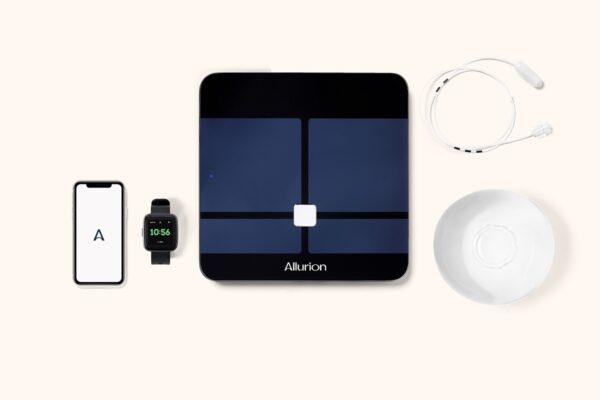

The market is buzzing with demand for obesity pills, but Allurion Technologies is building a case that its weight loss platform—a medical device and software—is a worthy competitor to these drugs and perhaps even a companion to them. The company debuted on the stock market Wednesday, raising $100 million to support commercialization of its medical technology globally and for continuing clinical testing to support an FDA submission in the U.S.
Allurion went public in a SPAC merger with Compute Health. Shares of Allurion opened on the New York Stock Exchange Wednesday at $9 apiece, which was the stock’s peak. At the end of its first day as a publicly traded company, shares closed at $7.25 each. The Natick, Massachusetts-based company’s shares trade under the stock symbol “ALUR.”
Allurion’s technology is a gastric balloon in the form of a capsule that patients swallow. The balloon inflates in the patient in a 15-minute outpatient procedure. While the balloon is in place over about four months, patients feel fuller so they eat less. The Allurion platform includes a scale, watch, and a mobile app that monitors weight loss and employs artificial intelligence and machine learning-techniques to analyze patient data collected by the system. In addition to providing insights to guide a patient’s progress, the technology also enables remote monitoring. Allurion co-founder and CEO Shantanu Gaur told MedCity News that this system is intended to lead to permanent behavioral changes that last long after the capsule deflates and passes out of the digestive system.
Since receiving marketing authorization in Europe in 2016, Allurion’s technology has been approved in several other markets. The product is indicated for people with a body mass index greater than 27, which Gaur said represents between 500 million and 1 billion people outside of the U.S. So far, the system has treated about 100,000 people in more than 50 countries. Post-marketing research shows that patients lose an average of 15% of their weight after four months, Gaur said. Those results are comparable to one year on Wegovy, the GLP-1 agonist obesity drug from Novo Nordisk that is in high demand. Gaur said the market opportunity for GLP-1 agonists is $75 billion to $100 billion in revenue by 2030. But those economic models assume that 5% to 10% of patients begin treatment.
“What about the other 90 to 95%?” Gaur said. “What about those who start a drug and then stop? I think it’s a massive opportunity. Because of these drugs, there’s an exponential rise in awareness about obesity and excess weight as something you can go to your doctor and talk about. Because that conversation is happening at an exponential rate, that is a major tailwind for our business.”
In the first quarter of this year, Allurion reported $14 million in revenue, a more than 10% increase compared to the same period in the prior year. The company aims to ramp up sales through a new commercialization alliance with medical device giant Medtronic. The deal signed in June enables Allurion to leverage Medtronic’s bariatric channels in Central and Eastern Europe, the Middle East, and Africa, Gaur said. Bariatric surgeons in these channels may use Allurion’s balloon and software for patients who don’t want to have surgery. For patients who do elect surgery, Allurion’s software may still be of additional help. The deal expands access to Allurion’s technology, whether it’s the balloon and the software or just the software, Gaur said.
Future partners could include large pharmaceutical companies, Gaur said. Patients who take GLP-1 drugs still need a nutritional or health coach to answer questions and guide the patient on what to eat and how to exercise.
“That’s all being done by human beings,” Gaur said. “What we’ve learned is through a large language model like GPT, you can create a coach that is trained on our weight loss program. Why not have a fully automated solution to triage requests, unlock more time and resources for humans?”
Allurion’s research includes developing a fully automated coach that could fill the role of a human but be available to users 24 hours a day, seven days a week. Gaur said this Allurion coach could potentially be used with obesity drugs as way to manage adverse effects and potentially enable lower dosing.
The U.S. clinical trial underway has a targeted enrollment of 1,000 patients who will be followed for 48 weeks. The randomized and controlled open-label study has two main goals: showing the percentage of patients who lose more than 5% of their body weight and comparing total body weight loss in the Allurion balloon group to the weight loss in the control group treated with lifestyle interventions. The trial is evaluating only the balloon, not the Allurion software. The study is still enrolling patients but Allurion said in securities filings that it expects to seek FDA approval in 2024.
Allurion revealed in February its plans to go public in a SPAC deal. The amount of capital available to the company is not just cash from the accounts of merger partner Compute Health. The total also includes a private investment led by RTW Investments, and equity investments from Medtronic and former Medtronic CEO and current Compute Health board Chairman Omar Ishrak. Allurion also has synthetic royalty financing, a loan in which repayments are determined by future revenue, as well as a secured term loan from an affiliate of Fortress Investment Group. At some point if it so chooses, Allurion has the ability to tap into an additional $100 million through an equity facility with Chardan Capital Markets, an investment bank.
Gaur said Allurion will use the capital to expand commercialization of its weight loss system globally in the markets where it is approved and to support the regulatory work needed to secure approval in the U.S. Allurion will also continue investing in research and development of new technologies, such as those employing generative AI.
Photo by Business Wire


















